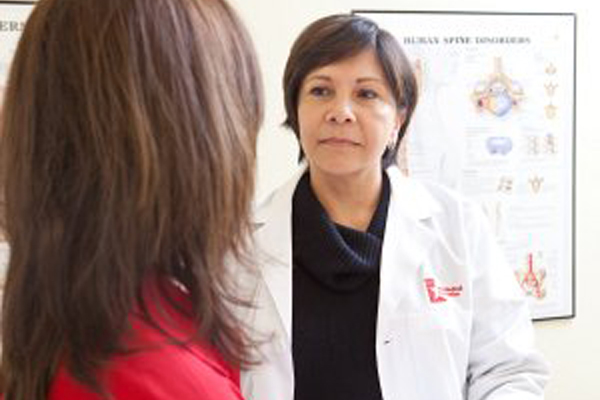
Do you feel safe at home? This question, especially in light of our unprecedented pandemic, is one of the most important questions we should be asking our patients.
 According to a 2010 survey, 1 out of 4 people will be victims of domestic violence. Sadly, reports show an increase in domestic violence cases since the COVID-19 outbreak began. Stay-at-home orders are necessary to help slow the spread of COVID-19, but they also put victims at greater risk of abuse. The idea of “I can stay at home and be safe,” doesn’t exist for some of us.
According to a 2010 survey, 1 out of 4 people will be victims of domestic violence. Sadly, reports show an increase in domestic violence cases since the COVID-19 outbreak began. Stay-at-home orders are necessary to help slow the spread of COVID-19, but they also put victims at greater risk of abuse. The idea of “I can stay at home and be safe,” doesn’t exist for some of us.
Studies show that women who talked to their health care provider about abuse were 2.6 times more likely to exit the abusive relationship. Many emergency medical records (EMRs) have the ever-elusive question, “Do you feel safe at home?” embedded in the rooming process. It often is one of the first questions our patients are asked and usually not asked by the physician. This scenario can almost always result in a denial response.
There are many factors that contribute to an increase in intimate partner violence, one of which is unemployment. In order to “flatten the curve,” many businesses were shut down or placed on limited capacity, sending our unemployment rates into a tailspin and increasing intimate partner violence along the way. According to the Center for Global Development, there are nine main (direct and indirect) pathways linking pandemics and violence against women and children. One of which is economic insecurity and poverty-related stress.
In fact, unemployment and economic hardship at the household level were positively related to abusive behavior. Research shows that among couples who report subjectively feeling high levels of financial strain, the domestic violence rate is 9.5% compared with 2.7% for couples who report subjectively feeling low levels of financial strain.
Steps taken to reduce the spread of COVID-19 also create additional obstacles for survivors when trying to escape abuse:
- An abusive partner may feel more enabled and escalate their isolation tactics.
- Travel restrictions may impact a survivor’s escape or safety plan – it may not be safe for them to use public transportation or fly.
- Programs that serve survivors may be significantly affected – shelters may be full or may even stop intakes altogether. Survivors may also fear entering a shelter due to being in close quarters with groups of people.
- Survivors who are older or have chronic heart or lung conditions may be at increased risk in public places where they would typically get support, like shelters, counseling centers, or courthouses.
For more than a decade, intimate-partner violence and sexual violence against women have been recognized as major global public health problems, as well as serious human rights abuses. The impact of these forms of violence on long-term health and well-being has been documented in publications such as theWorld Health Organization’s World Report on Violence and Health.
As physicians, facing difficult news and diagnoses with our patients is part of our daily role. We might be heartbroken about the ultimate reality for our patients, but we know what to do, what test to order, or what referrals to make.
However, what do we do when one of our patients has the courage to say, “No, I do not feel safe at home?” Those eight words can feel like a problem we do not know how to solve. We need the skills to know how to continue that conversation and provide the help they need. Partnering with our legal colleagues is how we can best help our patients.
Protective orders are known as one of the most immediate and successful forms of legal relief that the civil court system can offer victims of these crimes. Victims who get protective orders have much lower rates of re-victimization – one study shows an 80% reduction in reported subsequent victimization when a permanent protective order is issued. Truly, protective orders are the PPE for domestic violence!
The Texas Advocacy Project is a statewide organization whose mission is to empower the public and survivors of domestic and dating violence, sexual assault, and stalking in Texas through free legal services, access to the justice system, and education and prevention.
Every health care provider is legally required to take certain steps when a patient discloses family violence or when suspicion arises from injuries that might have been caused by family violence. According to the law, any medical professional who treats a person for injuries that the medical professional has reason to believe were caused by family violence is required to:
- Immediately give notice to the person regarding the nearest family violence shelter center;
- Document, in the person’s medical file that the notice was received and the reasons for the medical professional's belief that the person's injuries were caused by family violence—a well-documented medical record can help attorneys win court cases against the abuser; and
- Provide written notice in both English and Spanish to the person that is substantially similar to the form notice in Texas Family Code Section 91.003(3). Among other required information, the notice provides information on the person’s right to seek a protective order from the court with certain types of relief. This is where a “Notice to Adult Victims of Family Violence” card is helpful to have on hand to give to your patient.
Also remember that if a medical professional has cause to believe that a child’s physical or mental health or welfare has been adversely affected by abuse or neglect, the medical professional also has a duty to report such information within 48 hours of first learning about it to Texas Department of Family and Protective Services. The reporting requirement cannot be delegated.
From my colleagues at Texas Advocacy Project, I have learned of the following examples of the legal relief for which a patient may be eligible, not only for domestic violence, but also for other difficulties:
- Safety – Your patient experiencing intimate-partner violence feels unsafe because of the presence of an abuser in the home. An attorney can help your patient apply for a protective order with the court. A protective order may prohibit the abuser from staying in the home or from coming near the applicant and from harassing or threatening the applicant. If violated, the police are required to arrest and charge the abuser for violation of a protective order for each incident, even if no other laws are broken. Protective orders have been shown to help keep applicants safer and to reduce incidents of intimate-partner violence.
- Privacy – Your teenage patient is having suicidal ideations because a nude photo may be circulated amongst her classmates if she breaks up with her abusive boyfriend. An attorney can help your patient seek an injunction to prevent revenge porn and inquire on potential child pornography charges.
- Employment – Your patient is affected by sexual harassment and is fired when she speaks out at work. She loses her health insurance coverage. An attorney can help your patient launch an investigation against the employer, based on gender discrimination, and get coverage restored as a term of conciliation.
- Family law – Your patient discloses that she is pregnant as a result of a rape, and she is concerned about the rapist’s access to the child. An attorney may be able to help your patient terminate parental rights to sever any legal relationship between the child and the biological father.
- Education – Your minor patient exhibits effects of bullying at school. An attorney can advocate that the school impose a stay-away agreement and any other accommodations needed, as required under Title IX.
- Housing – Your patient discloses that she was raped in her home and no longer feels safe at her apartment complex. An attorney can help terminate her lease with no financial repercussions.
- Financial – Your patient is struggling to pay her child’s medical bills because the non-custodial parent has failed to pay his half of uninsured health expenses. An attorney can help your patient seek an order to garnish the non-custodial parent’s wages to cover unpaid health expenses.
Understanding how the medical and legal communities can work together to provide health and safety for our patients has been of great comfort to me. Attorneys focus on providing civil legal remedies while we healthcare providers can focus solely upon delivering quality healthcare in an environment where social determinants of health are adequately addressed and do not pose insurmountable barriers to desired health outcomes.
Visit the Texas Advocacy Project website to learn more about the project and the resources it provides.
Kelly Thorstad, MD, is a pediatrician in Austin. Heather Bellino, CEO of the Texas Advocacy Project, contributed to this story.